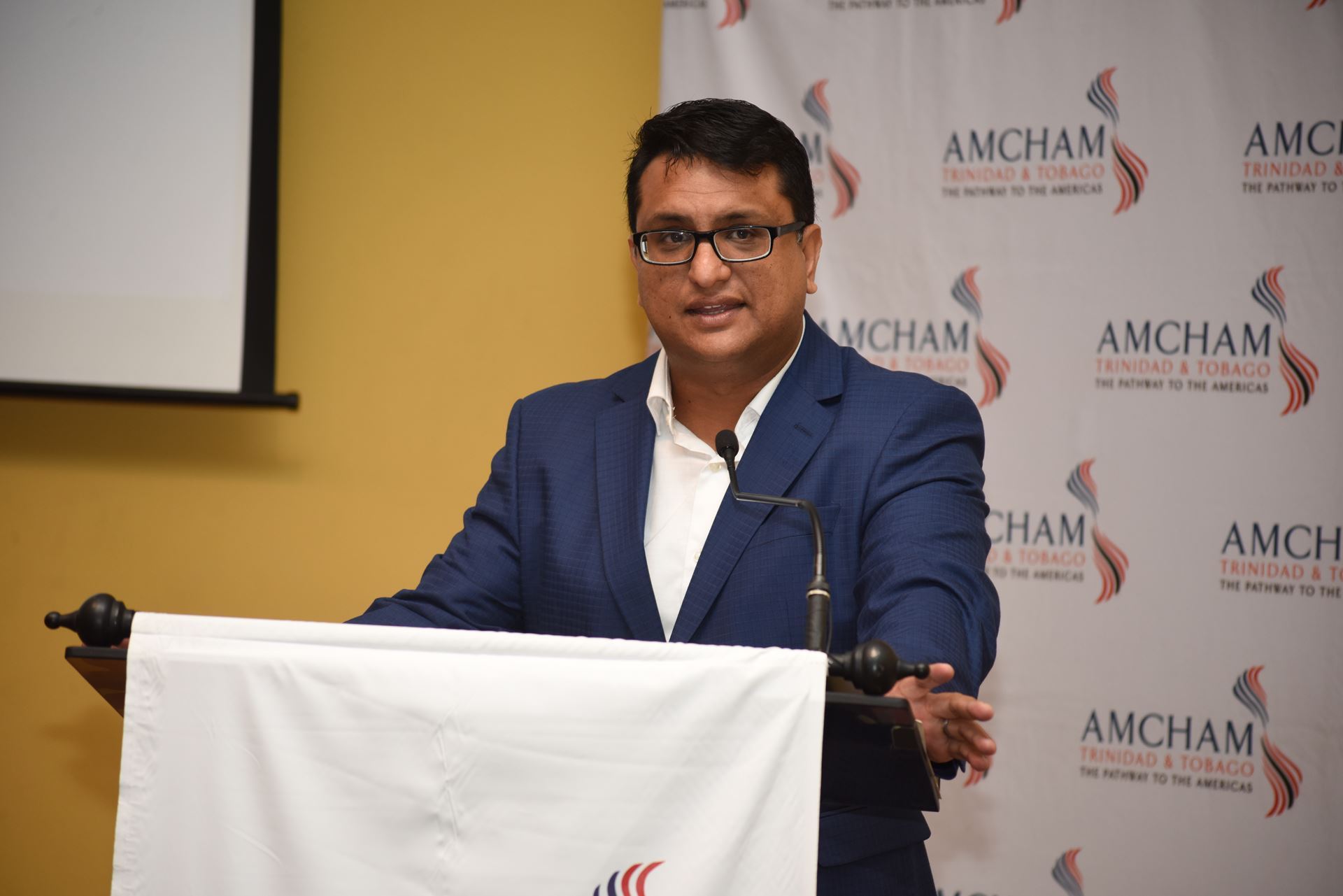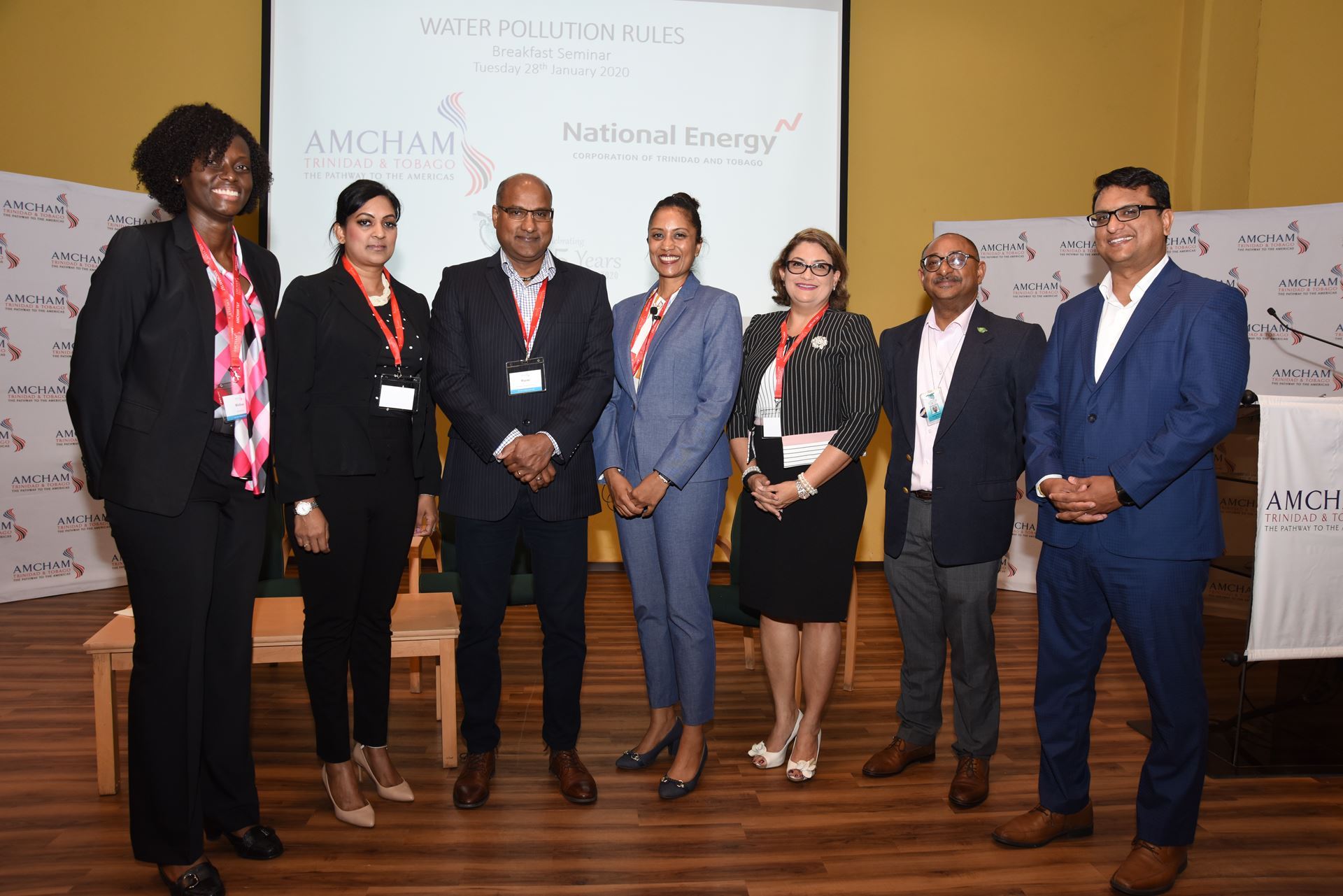AMCHAM T&T's Water Pollution Rules Breakfast Seminar
Welcome Remarks by AMCHAM T&T CEO - Nirad Tewarie
Good morning everyone and welcome to AMCHAM T&T's Breakfast Seminar.
AMCHAM T&T is regarded as the number one Business Service Organization in Trinidad and Tobago. We are the first stop for foreign investors seeking information and alliances, a value-added partner for domestic companies, and a powerful private sector lobby with the Trinidad and U.S. Government. Our strong mix of formidable local and international member companies, strong networking links, close association with the U.S. Embassy, alliances with the Association of American Chambers of Commerce in Latin America and the Caribbean (AACCLA); all ensure rapid access to what you need to compete effectively both locally and in overseas markets. We can therefore secure for members strategic information on doing business in a particular country; as well as set up introductions to the right business organizations or companies in the U.S. and throughout the Western Hemisphere.
This morning's seminar is one of the many ways we provide value to our membership and businesses in Trinidad and Tobago - bringing issues that affect us to the forefront and facilitating discussion. This Breakfast Seminar is focused on Water Pollution Rules. We are here today because we all agree that the Water Pollution Rules (2019) and the Water Pollution Regulations that came into effect in November 2019 will affect our operations in one way or another.
AMCHAM T&T is in full support of any legislation that would ensure good, clean water and the Polluter Pays Principle. We agree that our environment, and in particular our water resources must be preserved and valued. This is why we endorse the notion that those who pollute should bear the cost of remediation and more so, that businesses of any kind and of any service do no harm to the environment. In addition, we believe that a sustainable economy requires us to value wastewater and find ways to maximize its potential.
We must acknowledge that while our outputs may be a small amount from a point source, it can still affect miles of waterways which eventually lead to marine and water-dependent ecosystems such as rivers, mangroves, wetlands, and even the sea. We must, therefore, take responsibility for our actions. Not only paying for our pollution but by making every effort to reduce the number of contaminants we release into our country's waterways. This is a necessary step in creating positive change that will benefit Trinidad and Tobago and the environment for many years to come.
In April 2019, AMCHAM T&T, through its HSE committee, hosted a stakeholder consultation where a number of questions and concerns about the proposed Water Pollution Rules were raised. We were fortunate to have the Environmental Management Authority partner with us at this consultation, making it an interactive session, addressing some of those issues as they arose.
Following this consultation, we wrote the EMA highlighting some of the issues and concerns and recommended changes to the legislation. We are pleased to see, in the final version of the rules, that some of the highlighted issues were considered and appropriate changes were made, including:
· Adjustment of the annual fee equation; and
· Removal of the number of employees from the fee structure for the Monitoring and Inspection Fee
Many of you who were present at the consultation, are here again today - cognizant of the fact that these Water Pollution Rules will impact the operation of our business and that we, therefore, need to be clear on the major changes; what these changes mean for our organizations and how we can be compliant.
AMCHAM T&T maintains its call for the Water Pollution Rules to effectively deal with all who would pollute our waterways. All companies and sectors that pollute should pay to remediate and more importantly be held accountable as a disincentive to damaging the environment. We must also be cognizant and deal with non-point sources of discharge which also contributes to the overall lowering of water quality, so that companies that are seeking to be compliant are not made to solely, even unfairly bear the brunt of penalties.
We are fortunate again, to partner with the Environmental Management Agency to clear up some of our issues and answer our questions and erase any misconceptions that we may have about this legislation. It is our hope that when we leave here today, we are clear on how we are expected to comply with or even benefit from this legislation.
We are also grateful to our HSE Committee, which is very active and keeps its fingers on the pulse of safety, security, and the environmental issues that affect us. I would also like to thank my colleagues in the Secretariat, in particular, Melissa Pierre and Rey-Anne Mendez for all their hard work in not only making this event possible but in creating the positions to lead to better, more effective advocacy from AMCHAM T&T. Thanks to our sponsor the National Energy Corporation who like us saw the importance of creating a forum where the EMA could educate stakeholders on the changes to the Water Pollution Rules and interact with us and address some of the lingering issues.
Thank you and we do hope that this proves to be informative and beneficial.
END.
(At AMCHAM T&T's Water Pollution Rules Breakfast Seminar (l-r) Melissa Pierre, Senior Trade and Policy Specialist, AMCHAM T&T, Varsha Ramharrack, Chair of AMCHAM T&T's Environmental Sub-Committee, Wayne Rajkumar, Manager Technical Services, Environmental Management Authority, Cindi Nandlal, Chair of AMCHAM T&T's H.S.E. Committee, Camilla Arjoonsingh, Manager H.S.S.E. National Energy Corporation, Hayden Romano, Managing Director, Environmental Management Authority and Nirad Tewarie, AMCHAM T&T, CEO.)

